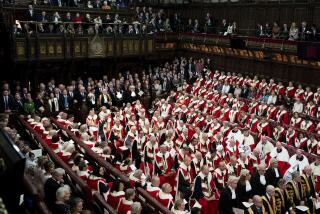House of Commons Becomes House of Blues for Conservative Members
- Share via
LONDON — It’s nearly 7 p.m. In a House of Commons bar overlooking the River Thames, George Walden is waiting for bells to signal it’s time to vote.
For Walden, a 56-year-old former diplomat, Parliament’s thrill is gone.
“I’m not actually prepared to spend the next 20 years doing this sort of thing,” he says. “How are we going to keep the health and social security budgets going? That is what government is about now--and the answer is we can’t, and then it gets rather nasty.”
Walden is one of 52 legislators from the governing Conservative Party who have announced that they will not run again in the national elections that must be called within the next year. That is nearly one-sixth of the 326 seats held by the party.
“It is very striking nowadays that members of Parliament don’t hang around in their 70s like they used to,” said Michael White, political editor of The Guardian, a liberal London newspaper.
Echoing sentiments of some of the dozen U.S. senators not seeking reelection this fall, departing Conservatives complain that serving in the 1,000-year-old Commons--once a prestigious sideline for landowners or lawyers--is both more onerous and less glamorous.
From Monday to Friday, their job is to toe the party line in the 651-member Commons, Parliament’s lawmaking body.
Weekends it is back home with the buzzing fax machine and the grumbling constituents. Often they want things that the creaking welfare state will no longer deliver--from a quick hip replacement on the free National Health Service to renovation of a public housing apartment.
“Members of Parliament spend their time quite literally now on domestic things. It’s not what Churchill came here for,” says Walden, whose wealthy Buckingham district is among the more secure Conservative seats.
Disenchantment is less a problem for the opposition Labor Party. Twenty-eight of the 273 Labor lawmakers say they will not run again, mostly because of age.
The motives behind the Conservative exodus are more complex.
Some are stepping down because of age. Some younger ones are looking for higher-paying jobs--after a 26% raise they voted themselves July 10, members of Parliament have an annual salary of 43,000 pounds, about $66,500.
There is grumbling about a new rule requiring reports on outside income and restricting “paid lobbying,” the acceptance of fees to bring up an issue in Parliament. The change followed a clutch of scandals and allegations of sleaze among Conservatives.
News media intrusion into private lives also is a complaint.
Even stronger forces could be the fear of personal defeat and distaste at the prospect of being in opposition after the Conservatives’ 17 years in power.
Polls consistently put Prime Minister John Major’s Conservatives far behind the Labor Party.
Many Tories came to office in more exciting times, delivering the votes for Margaret Thatcher’s crusade to shake up Britain. Riding huge Parliament majorities, she weakened labor unions, went to war with Argentina, sold off dozens of state enterprises and reveled in the ideological and military confrontation with Soviet communism.
Sir Anthony Grant, 70, lived through all that and loved it. Now he’s leaving.
He is depressed by lawmakers “fooling around for the benefit of TV and radio” and by the growing number of Parliament members who have no career but politics.
“To be really effective, Parliament must be a microcosm of the people as a whole--rich ones, poor ones, manual workers, lawyers, it doesn’t matter what it is,” he says.
“Now what you’re getting are researchers, people who are dedicated solely and simply to political theory and dogma.”
He entered the Commons 32 years ago from the traditional Tory background--private school and Oxford, army service, law career.
Grant says the influx of ambitious, professional politicians makes the Commons both less fun and less able to act as a check on the government.
“When I first came here the last thing a lot of people wanted was to become a government minister,” he says. “Nowadays when they come in, they are not so much eager to criticize the executive and control it; they are keen to join it.”
Some say the old camaraderie in the Commons--the long lunches with fellow Conservatives, the insider jokes--are lacking these days.
On the other hand, rank-and-file legislators can no longer be ignored. With Major struggling along on a one-vote majority--smaller parties allied with one side or the other control 60 seats--parliamentary rebels get instant national publicity and set off feverish speculation that the government may fall.
Most votes, however, remain mundane, often late-night affairs, with ordinary “backbenchers” turning up to vote the party line.
“You get a feeling of self-contempt,” says Sir Julian Critchley, 65, who is retiring after 30 years in the Commons. “Why am I here wasting my time? Why don’t I go out and get a proper job? All these things one asks oneself at times.
“But after a while it’s a very easy job, like being a minister in the Church of England. You can do as much or as little as you like.”
More to Read
Sign up for Essential California
The most important California stories and recommendations in your inbox every morning.
You may occasionally receive promotional content from the Los Angeles Times.













